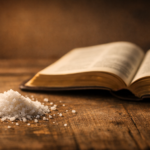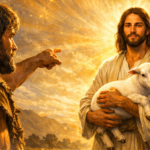“Humility is Greatness” – James 4:6-10 & Mark 9:30-37
1. Who is the Greatest?
Who is the greatest? It’s a common question, a common debate. Greatness and value are often determined in our world by education, salary, possessions, accomplishments and things like that. The world is full of it… the baseball season is coming to an end soon, and at the end they will select an MVP for the season – the Most Valuable Player, the greatest player. It’s possible that young Vladimir Guerraro Jr. of the Toronto Blue Jays will accomplish what his father did 17 years earlier. Other sports also recognize the accomplishments of the year’s best athletes, but acting and music also honour their best in annual award shows.
It starts early in life. You often hear kids proclaiming that they are the greatest at something – academics, strength, skill. Sometimes kids even boast about their fathers. Three young fellows were doing exactly that one day. One boy, whose father was a lawyer, bragged that his dad worked on a case for a couple of months and got $20,000. The second boy, played the game of one-up-man-ship by stating that his brain surgeon father gets $20,000 for doing a couple of brain operations in a week. The third boy, whose father was a Lutheran pastor, said, “When my dad preaches for just 20 minutes it takes four men to carry the money forward.”
If you’re old enough, you’ll be familiar with, and you’ll smile as you remember Mac Davis’ 1980 egotistical, greatness-professing (but approaching greatness through the back door) hit song: “O Lord, It’s Hard to be Humble.” The chorus said: “O Lord, it’s hard to be humble, When you’re perfect in every way. I can’t wait to look in the mirror, ‘Cause I get better looking each day. To know me is to love me, I must be a bleep of a man. O Lord, it’s hard to be humble, but I’m doing the best that I can.” Perfect, good looking, lovable – what a great man!!
2. Even the Disciples!!
Discussing greatness isn’t just a 20th or 21st century plague. It seems to be an innate part of our sinful human nature to stick out our chest and think we are the best. Even the disciples of Jesus got into the act in the 1st century. There they were, on the way to Capernaum – arguing about who was the greatest.
We get a sense of the guilt the disciples felt when Jesus asked them, “What were you arguing about on the road?” Three small words say it all… “they kept silent.” They were guilty, they were ashamed, and they knew it, so, in American legal terms, they pled the Fifth Amendment… they said nothing. As we consider the times we have boasted and claimed to be the greatest – in our family, among our friends, at work – we would do well to keep quiet, too, knowing that we are guilty of pride, knowing that we deserve the probing and condemning question of Jesus: “What were you arguing about? What were you thinking about?”
This Mark 9 occasion wasn’t the only time the disciples discussed greatness. In Mark 10, James and John asked for places of honour in the kingdom of glory. The other disciples were peeved about that – probably mad that they hadn’t thought about it first! Jesus had to straighten them out again and talked about servanthood. In Matthew 18, they simply asked Jesus the question, “Who is the greatest in the kingdom of heaven?” In Luke 22 – at the Lord’s Supper – a dispute arose about which of the disciples was greatest, maybe about who gets to sit beside Jesus for that famous painting by Leonardo Da Vinci. At any rate, for a fourth time, Jesus had to talk to them about humility and service rather than greatness and boasting.
3. Jesus’ table-turning response
So, what were Jesus’ responses to these discussions about greatness? Even though they were silent, Jesus knew the thoughts and arguments of the disciples that day, and He did something very interesting, and I’m sure very memorable for the disciples.
Maybe you’ve watched or heard about the British drama series Downton Abbey. It portrays a great household, clearly divided between nobility and servants. There is little doubt about who is greatest: Robert Crawley, the Earl of Grantham and head of the mansion. His wife and three daughters are arrayed underneath him. The servants, including the butler and the housekeeper, all have their place, and are beneath the members of the family – both figuratively and literally as they live and work in the downstairs of the mansion. They all slave away to provide the family with a life of comfort, ease, and luxury. The lowest in the house, as the series begins, is Daisy, the kitchen maid. Her duties include kneeling down to dirty her hands cleaning the fireplaces. She is last of all, servant of all. The drama depicts the world’s standards of greatness and service.
Jesus’ words turned the tables of the world’s normal concept of greatness upside down. “If anyone wants to be first,” Jesus said, “he must be last of all, and servant of all.”
To concretely illustrate His concept of greatness, Jesus took a little child and made that child an example of greatness in His kingdom. He indicated by His words and His actions that day that He loved children and welcomed children. In fact, Jesus uniquely connects Himself with children by saying, “Whoever receives one such child in my name receives me.” There are a couple of words for children in Greek: teknon refers to a child or young lad; paidion refers to a younger child, in fact, an infant or toddler perhaps up to five or seven years of age. The little child that Jesus had taken in His arms was noted in Greek to be a paidion. This was a little one.
So, Jesus says that one who serves is great. He says that one who receives a child (paidion) is great. In one of the other argument passages, he says that one who humbles himself and believes like a child is great. True greatness does not come from having servants arrayed underneath, but from serving others. Jesus’ words would declare Daisy the greatest in the Grantham mansion, above any member of the family.
In the Kingdom of God, there is not meant to be competition like there is in the world, where everyone tries to be better than the rest and ultimately the greatest. In the Kingdom of God, Jesus says, if you want to be first and great, you must be last and a servant. If you want to be big, you must be little… like a child.
In Mark 10, Jesus has another encounter with children and their parents, and this time the disciples are mad and attempted to chase them away, perhaps believing that Jesus was too important and too busy for children. Jesus made it clear: “Let the little children come to me, and do not hinder them, for the kingdom of God belongs to such as these. I tell you the truth, anyone who will not receive the kingdom of God like a little child will never enter it.”
4. James 4 – proud vs. humble
In our Epistle reading, James pick up that same theme with his words about humility. “God opposes the proud, but gives grace to the humble… Humble yourselves before the Lord, and He will exalt you.” God has something to say about prideful, boastful opinions of one’s self… just 4 words: “God opposes the proud.” If you are high on yourself, if you think you’re the greatest, if you boast of your own accomplishments… God opposes you! God is not going to make it easy on you.
It’s like that story of the talking donkey in the Old Testament. Balaam was hired by King Balak of Moab to curse God’s people of Israel. Initially he said he could only do what God told him to do, but eventually he got on his donkey to issue the curse. As they were going along a narrow path, the donkey saw what Balaam didn’t – an angel of God blocking the way. The donkey stopped a couple of times and Balaam struck the donkey. Finally, the donkey laid right down and was struck again. That’s when the donkey started reprimanding Balaam until Balaam finally saw the angel in the way. God opposed the proud, money-hungry, stubborn Balaam.
In the same way, if you’re stubbornly going your own direction, a way other than God’s way, God’s going to oppose you, God’s going to send an angel to block the way. In contrast to that, James says that God gives grace to the humble. He goes on to urge people – US – to submit to God, to draw near to God, to purify our hearts, and then again to humble ourselves before the Lord.
5. Humility is greatness
What does humbling ourselves mean? What does it look like for you?
Listen again to Jesus’ various responses to the questions and arguments about greatness:
“If anyone wants to be first, he must be last of all, and servant of all.”
“Whoever receives one such child in my name receives me.”
“That one who humbles himself and believes like a child is great.”
“Let the little children come to me, and do not hinder them, for the kingdom of God belongs to such as these. I tell you the truth, anyone who will not receive the kingdom of God like a little child will never enter it.”
“Whoever would be great among you must be your servant, and whoever would be first among you must be your slave, even as the Son of Man came not to be served but to serve.”
After Jesus washed His disciples’ feet, He interpreted His actions for them: “If I then, your Lord and Teacher, have washed your feet, you also ought to wash one another’s feet. For I have given you an example that you also should do just as I have done to you.”
Paul taught about humility in Philippians 2:3,4 – “Do nothing from rivalry or conceit, but in humility count others more significant than yourselves. Let each of you look not only to his own interests, but also to the interests of others.” A little bit more servant Daisy, a little bit less snooty nobility.
A few weeks ago, we heard Paul apply this principle in this way: “Submit to one another out of reverence for Christ.” That submission is a voluntary yielding in love.
Jesus is making clear in all these responses that humility is greatness, that greatness is found in being humble, in being a servant.
So again…what does that table-turning response of Jesus look like for you? In your life? We don’t wash feet in the same way as they did in 1st century Israel. But there are other ways that – out of love for others – we can voluntarily yield our rights and privileges, and serve others.
You might – without even being asked – shovel the snow off your neighbour’s sidewalk in January.
You might offer up a “date night” to your son and daughter-in-law while you enjoy your grandchildren.
You might give an elderly friend a ride to a doctor’s appointment.
You might take a meal over to someone who has just lost a loved one or to a couple who has just had a baby.
You might consider who is humble today – like these new believers in Christ – and then be a brother or sister who helps them learn and grow, to be like Jesus, to draw near to God.
You might… well, you fill in the blanks – there are lots of ways that we can serve others.
Oh, and here’s something many are doing – wearing a mask here in the sanctuary to respect and protect others, even though provincial health orders don’t require it for churches. That, in its own way, is serving others in love.
6. Jesus – great in His servanthood
Although the Gospel reading featured the disciples’ argument about greatness, it starts off with humility, and giving grace. Jesus said [about Himself], “The Son of Man is going to be delivered into the hands of men, and they will kill him. And when He is killed, after three days He will rise.” As St. Paul wrote to the Philippians, Jesus did not hold on securely to His divine nature, but He humbled Himself, emptied Himself, and was willing to die on the cross – ALL FOR US!! So, when James wrote that God opposes the proud but gives grace to the humble – well, that grace was most evident when we look at the cross and the empty tomb. That’s where we find God’s grace for us.
Pastor Jock Ficken wrote: God’s grace is not just ‘nice’ grace (things like: God makes my child part of His family by Baptism, God gives me daily bread, God gives me peace in my family, God gives me good government, good weather, good friends, etc.). No, God’s grace is amazing! grace. God offers me grace even though He knows what kind of person I have been! That’s nothing less than amazing! Grace, in its truest form, is understood to be God’s undeserved gift of forgiveness and salvation in Jesus. It comes to those who humbly acknowledge and profess Jesus as Lord and Saviour. That is amazing!
The disciples argued about who is the greatest. They somehow didn’t realize that the One in their midst, the One before whom they were silent, was the greatest of all!! Jesus is great! Many polls that rank the greatest person who ever lived list Jesus in top spot. Some cite his teachings, but Jesus’ own words in v. 31 nail it (excuse the pun): “He will be killed and after three days rise!” Killed for your forgiveness and raised for your salvation. He had come to be a servant, to give His life as a ransom for many… for you!
The Servant of all sets you free to serve, and in that humble service to be great. Jesus exalts you to be his humble servant, reflecting His own glory to all you serve. Amen.






